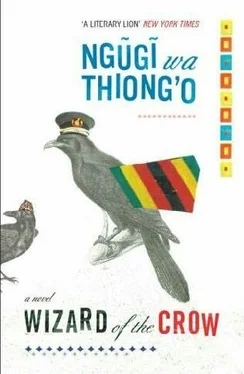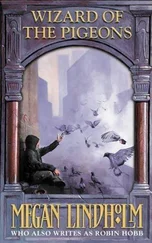“So you enjoy saying it over and over again, you smelly cunt of a man. You piece of dirt. A poor excuse for manhood. Away from my sight,” said the Ruler, waving him away. Even before the Ruler had finished calling him names, Machokali was in full flight back to his seat.
“Wait!” the Ruler shouted at him. “Come back here. Give me back that note! Or are you planning to share it with the others?”
Machokali had forgotten that he was still holding it. He returned and gingerly handed it to the Ruler. As Machokali backtracked, he was agog: the Ruler had grabbed the piece of paper, put it in his mouth, chewed it, and swallowed it, all while staring at Machokali.
“I must never hear this matter out of anybody’s mouth.”
It was the sound of the plane landing that announced the return of the Ruler from his famous visit to America, for it was louder than thunder. People said that only His Mightiness could produce thunder without lightning and rain, but there was something wrong with it, people added, because the Ruler came back home under the cover of darkness, like a thief. The procession of diplomats, ministers, and dancers that always greeted him at the airport whenever he returned from visits abroad was nowhere in sight. And when he did not appear on television, people confidently asserted that, yes, something had to be wrong; the Ruler always appeared on live television whenever he returned from abroad. When after many days there were still no photographs or television footage of his return, people started whispering: had his corpse been shipped back from America?
Even when Big Ben Mambo, the Minister of Information, issued a statement that the Ruler was in retreat in the State House to think about the future of the country, the rumors did not abate. If anything, the statement only added fuel to their fire.
Many of the ministers were also in the dark as to why the Ruler had become inaccessible in the State House, and even fewer knew that he was sobbing like a child, though no tears fell from his eyes. Unbeknown to them, his desire for vengeance against the Wizard of the Crow was all-consuming. But unlike that other time when his tears filled several drums, this time no tear would actually fall, which increased his frustration and made him sob all the more. Unshed tears of an unrequited desire for vengeance are exhausting and require privacy.
The only people allowed into his presence were the leaders of the armed forces, because he wanted to hear their reports before he met with Sikiokuu and other ministers. When they finished he asked them to command from the State House, really to keep an eye on them because he feared the possibility of a military coup. But although the Ruler was cordoned off and protected by the military, the words in the wizard’s note still found a way of creeping into his mind- the Ruler is Pregnant -and, hearing them, he would start as if somebody were actually whispering the words in his ear. Rumors say that there was a time when he grabbed one of the army leaders who happened to be nearby and asked him, Did you dare to say “the Ruler is pregnant”? And the military man cried out, Oh, no, no, I have not spoken a word. When the Ruler realized his mistake, he claimed that it was a joke: I wanted to test that you are alert at all times. But still he warned the man never to repeat the incident to anyone, even himself. The officer said, What are you talking about? I don’t remember a thing, and the reply, apparently sincere, made the Ruler become even more anxious, because if the man could so easily forget what had just transpired, how could the Ruler be sure that the man would not as easily forget that he had just been warned never to repeat the incident to himself or anybody else? But he did not want to ask him what it was that he was not remembering, because he did not want the army officer to repeat the words the Ruler is pregnant. His mind was abuzz, and, not knowing what to do, at such times he would sob tear-lessly with even greater frustration and bitterness, his shoulders heaving and his body shaking, as did not only the building but the entire country, some people mistaking this effect for an earthquake or volcanic eruption somewhere.
How dare this bastard of a Wizard of the Crow call me a woman? he would ask himself over and over again. Is he implying that my power is waning? Is that why the leaders of the West did not receive me? Maybe they had looked down on him because recently there had been no blood as in the early days of his rule, when he had unflinchingly killed Aburlrian communists galore. How can I show them that I am still the man I was? he wondered. But he was still mindful of his self-imposed moratorium on shedding blood in order to impress the Global Bank, and his sense of helplessness deepened his frustration. He felt abandoned by his friends in the West and despised by his own people, to the extent that a sorcerer dared call him a woman to his face. And not only the sorcerer. Even women themselves…
He did not complete the thought, for it suddenly made him recall the women of the drama of shame at Eldares, and the memory of the deed, in the presence of diplomats from all corners of the globe, made his brain heat up with renewed fury. The drama of shame was the origin of the current lack of fear and respect. Nyawlra came to mind. Has she been apprehended? he wondered. He remembered the recent spate of husband beating. Did I not give Sikiokuu the task of investigating the whole question of women and their role in dissident politics? He decided to summon Sikiokuu, thus breaking his self-imposed isolation, at least from his ministers. Sikiokuu, Minister of State in the Ruler’s Office, felt a surge of pride at being the first cabinet member invited for an audience with the Ruler since his return from America.
The Ruler did not waste time with preliminaries, going straight to the heart of the matter. Before I set out for America I gave you several tasks: to arrest Nyawlra, break the backbone of the Movement for the Voice of the People, and investigate the queuing mania. Reports reached me in America that women are the ones now ruling Aburlrian homes and have become so bold as to establish people’s courts and beat up men in broad daylight. What have you to say to this?
If Sikiokuu was taken aback by the new size and shape of the Ruler, he did not show it by look or gesture. Sikiokuu had a few informants among the security folk, as well as allies among ministers. Even when the chief told him to cut out his prologue of praise and get to the point, he did not seem unduly perturbed.
He did not know where or how to begin, Sikiokuu said, for he had much to report, and although he had not yet broken the back of the Movement for the Voice of the People completely, he had planted undercover agents in virtually every sector of society and had managed to harass the illegal movement into inactivity. Most important, he had been able to unearth and identify the brains behind all the evil in the land. He paused to see the effect of his revelations. The Ruler raised his eyebrows and asked: Who? Sikiokuu’s face tightened and his cheeks became puffed up with barely suppressed anger.
“How can I say when I hate the very thought of my tongue having to repeat his name?”
“Who is he?” the Ruler asked, raising his voice with impatience, which is exactly what Sikiokuu had wanted, to seem as if he were simply acceding to the Ruler’s command.
“The Minister for Foreign Affairs,” he said, lowering his voice in sadness at this obvious betrayal of trust.
“Machokali?”
“He of the very name you have just mentioned,” Sikiokuu said, once again showing the greatest reluctance to say the name.
Читать дальше












